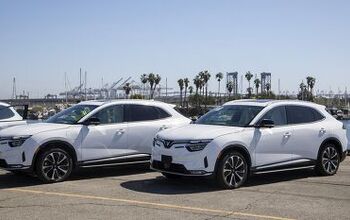Driverless Vehicle Dilemma: Who Should Your Car Kill If Things Go Bad?

We’re told the future will bring us a blissful, autonomous driving experience that allows us to enjoy the scenery as we read our tablets and enjoy a Venti Macchiato, free of the burden of driving decisions and liability.
Now, for the less happy stuff: who should your safety-minded car kill if it’s forced to make an autonomous Sophie’s Choice-style decision — an occupant or a pedestrian?
A study published in the journal Science tackled that question, with researchers posing various scenarios to 1,900 participants via an online survey. The results show our sense of moral duty is matched by our sense of self-preservation.
In the first scenario, respondents were asked to imagine themselves riding in a driverless car, when suddenly 10 pedestrians materialize in the middle of the road. They could choose from two outcomes: kill the 10, or swerve off the road and kill the passenger. Over three-quarters (76 percent) of respondents said the moral choice was to let the passenger get it.
One death is better than 10, right? Most would agree, but people are less likely to make the proper moral choice when it’s themselves or their loved ones in danger.
In another scenario, “respondents were asked to indicate how likely they would be to buy an AV programmed to minimize casualties (which would, in these circumstances, sacrifice them and their co-rider family member), as well as how likely they would be to buy an AV programmed to prioritize protecting its passengers, even if it meant killing 10 or 20 pedestrians.”
Guess what? Participants chose to look out for Number One. The future might be high-tech, but it isn’t free of ethical conflicts. Another scenario showed people aren’t willing to sacrifice a passenger to save a single pedestrian life.
Driverless vehicles are in their infancy, so the issue isn’t a big one with the general public. But it might be one day.
Speaking to the Wall Street Journal, Karl Iagnemma, CEO of software company nuTonomy (which develops autonomous vehicle technology), said the emerging industry is too busy working out the bugs to worry about moral dilemmas.
Existing driverless car technology can’t tell “a baby stroller from a grandmother from a healthy 21-year-old,” he said.
Besides showing us how fractured our psychology is, the study showed that enthusiasm for driverless cars is a pretty niche thing. Who gets excited about autonomous vehicles? Young men, apparently. With some exceptions, women and older people aren’t interested.
[Source: Wall Street Journal, Science] [Image: Volvo Cars]

More by Steph Willems
Latest Car Reviews
Read moreLatest Product Reviews
Read moreRecent Comments
- 3-On-The-Tree I was disappointed that when I bought my 2002 Suzuki GSX1300R that the Europeans put a mandatory speed limiter on it from 197mph down to 186mph for the 2002 year U.S models.
- ToolGuy Did anyone catch that Boeing Starliner launch earlier tonight?
- Lou_BC This is less harmful to one's re-election chances than harder driver's licence exams and making people re-test.
- 28-Cars-Later Probably should investigate the buyers too, maybe a basic psych eval?
- 28-Cars-Later "Despite nobody really digging the moniker, Honda has told Autocar that it only plans on changing the name of the model in China (as part of a more comprehensive facelift) because that’s where they’re having the most trouble and anticipated the largest sales volumes.""Customers in China just can’t pronounce it,” explained the source."So the Chinese are class A customers but frack the rest of y'all we don't care what you think or can understand?


































Comments
Join the conversation
Why debate? It's so simple: the car should be set to protect its own passengers. We have laws, lawyers, and insurance companies to hash out those liability details. with the autonomous computer absolving the driver of personal responsibility, nobody goes to jail, it's strictly a financial compensation issue. OTOH, in medieval times, animals were held criminally negligent. If a horse pulling a wagon reared up and the wagon overturned, killing the owner, the horse would be put on trial and hanged if found guilty of murdering its owner! Driving schools don't tell you about those early traffic laws, but the principle should be applied: the control module that kills should get the the electric chair. Those modules that learn from experience might get the wrong idea, like people do.
Interesting too would be the ability of the autonomous vehicle to protect the occupants from being rear-ended by a non-autonomous vehicle while performing the actuarial meat-grinding algorithm to protect the most "beneficial" meat bags... Pedestrian 1: YOLL: 10 PROD 0.2 FIN +340k SOEC RANK 0.5 Occupant 1: YOLL 30 PROD 0.85 FIN - 260k SOEC RANK 0.9 etc, etc. Could get interesting... :-)